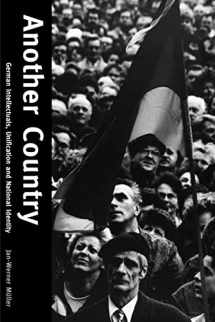
Another Country: German Intellectuals, Unification, and National Identity
ISBN-13:
9780300190731
ISBN-10:
0300190735
Author:
Jan-Werner Müller
Publication date:
2000
Publisher:
Yale University Press
Format:
Paperback
322 pages
FREE US shipping
on ALL non-marketplace orders
Marketplace
from $26.04
USD
Marketplace offers
Seller
Condition
Note
Seller
Condition
Used - Good
May contain marks and or highlighting. Used items are NOT guaranteed to include components, i.e. CDs, Access codes, etc. Ships from our Kentucky facility. Ships same day if ordered before 1 PM EST, Monday - Friday. Contact us with any questions!
Book details
ISBN-13:
9780300190731
ISBN-10:
0300190735
Author:
Jan-Werner Müller
Publication date:
2000
Publisher:
Yale University Press
Format:
Paperback
322 pages
Summary
Another Country: German Intellectuals, Unification, and National Identity (ISBN-13: 9780300190731 and ISBN-10: 0300190735), written by authors
Jan-Werner Müller, was published by Yale University Press in 2000.
With an overall rating of 3.6 stars, it's a notable title among other
books. You can easily purchase or rent Another Country: German Intellectuals, Unification, and National Identity (Paperback) from BooksRun,
along with many other new and used
books
and textbooks.
And, if you're looking to sell your copy, our current buyback offer is $0.3.
Description
How did German intellectuals react to unification and how have they conceived the country’s national identity and its new international position? This important book not only examines changing notions of nationhood and their complicated relationship to the Nazi past but also charts the wider history of the development of German political thought since World War II―while critically reflecting on some of the continuing blind spots among German writers and thinkers.Jan-Werner Müller explains why many intellectuals reacted so defensively to unification and why unification plunged the Left in particular into a major crisis that is yet to be overcome. He analyzes the responses of Günter Grass, Jürgen Habermas, and others of the so-called skeptical generation, who broke with the tradition of the illiberal interwar intellectuals and reinvented themselves as a “democratic elite” who sought to transform political culture after the war―and tried to do so again after 1989. He discusses the German idea of “constitutional patriotism” as well as the antinationalism of the “generation of 1968,” and provides the first full-scale analysis of Germany’s “New Right.” Written clearly and elegantly, the book assesses the acrimonious debates about the future of the nation-state and public memory in Germany and offers more general reflections on the role intellectuals can play in post-totalitarian societies.


We would LOVE it if you could help us and other readers by reviewing the book
Book review

Congratulations! We have received your book review.
{user}
{createdAt}
by {truncated_author}


